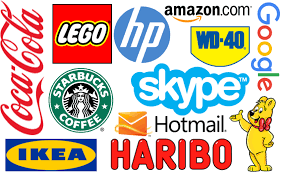How the World’s Biggest Brands Got Their Names

The origin stories of global brands can be fascinating, surprising, and sometimes amusing. A company’s name can be more than a mere label. It’s often an idea or emotion-evoking term that sticks with consumers and becomes a part of their lives.
From tech giants to household products, each brand’s name conjures up the logo, advertising, reputation, and story that drive its profits. The stories of how several top global brands got their names have become part of their unique lore.
Nike: The Goddess of Victory
The name “Nike” is rooted in ancient Greek mythology. Founded by Phil Knight and Bill Bowerman in 1964, the now-massive athletic wear company was originally focused on specialized, Japanese running shoes and was called Blue Ribbon Sports. In 1971, they split with Onitsuka and drew on concepts of athleticism, victory, and triumph from the well-known Greek goddess of victory: Nike.
Both Bowerman and Knight, athletes themselves, were familiar with the pressure and motivation of competition. By invoking the name Nike, they formed a company name that would be known for much more than basic sportswear. The slogan “Just Do It” was an instant hit with customers— memorable and powerful like the goddess of victory herself.
The Amazon of the Global Marketplace
Jeff Bezos originally envisioned the world’s biggest online bookstore with a name to match his expansive vision. He toyed with alternatives like “Cadabra” but found Amazon while searching through a dictionary, and the name stuck. Vast, exotic, and seemingly endless, the Amazon River and rainforest are known for their incredible size and unexplored potential.
A company name that begins with “A” was also a solid, strategic choice as it placed Jeff’s creation nearly first in alphabetical listings.
Sometimes a name matches a company; other times, a company grows into its name. In this case, the online marketplace that is now Amazon became much more than a bookstore. It’s a household name with a value of $2.139 trillion, second only to Walmart in revenue.
MGM Grand: A Casino Legacy Rooted in Hollywood Glamour
The MGM Grand, one of the most iconic casino brand names in Las Vegas, is steeped in glamour and Hollywood history. MGM stands for Metro-Goldwyn-Mayer, the legendary film studio formed by Marcus Loew in 1924 when he combined Metro, Goldwyn, and Louis B. Mayer Pictures studios. When the casino was founded in 1993, it instantly harnessed MGM’s star power.
The MGM brand is more than a gambling resort; its reputation for excitement and legendary entertainment also makes it the top choice of over 100 American casino sites among many online gamblers.
Häagen-Dazs: A Fictional Danish Tribute
In 1961, in the Bronx, American Reuben Mattus was brainstorming names for his ice cream company. He wanted something that would honor Denmark’s support of Jews during World War II and sound like an imported, high-quality product.
He invented a fictional name to suggest European sophistication, using letters that don’t actually appear in the Danish alphabet (such as ä and z), and printed a Scandinavian map on the label.
Over 60 years later, the brand name Häagen-Dazs still evokes ideas of old-world craftsmanship and premium market positioning, proving that creativity in business names can pay off.
How the Name Google Came to Be
Google’s naming story is a perfect example of a happy mistake. When Sergey Brin and Larry Page were developing their search engine at Stanford, they were captivated by the mathematical concept created in 1920 by Edward Kasner and his nephew. The “googol” describes the number 1 followed by 100 zeros (10^100). Sergey and Larry loved the idea of a number so large it could represent nearly infinite information, and it felt like an appropriate name for their worldwide information-exploring tool.
A serendipitous spelling error led them to register their domain as “Google” instead of “Googol.”
They decided to keep the accidentally evolved version because it sounded more playful, easier to say, and remember. That instinct proved to be brilliant as the company grew from school research project to global technology giant.
Today, Google is so well-known and entrenched in the daily lives of people everywhere that it’s even become a verb—a stand-in for the word “search.” It’s hard to imagine that the brand could have been as successful with a slightly different name.
The Maritime Folklore Foundations of Starbucks
Where the world-famous coffee shop Starbucks was founded in Seattle, maritime history and seafaring tales are part of the local charm. The founders were inspired by a Moby Dick character named Starbuck, the first mate of the whaling ship Pequod.
Co-founder Gordon Bowker first suggested the name “Pequod,” but the idea was abandoned after considering how unappealing a cup of “Pee-kwod” coffee might sound.
It’s true that sound, imagery, and overall brand story can propel a company to success or let it fall flat. Starbucks has become a cultural experience, with a connection to the Pacific Northwest and coffee-trading history.
Would a Rose by Any Other Name Smell as Sweet?
What’s in a great brand name? Sometimes highly strategic, other times lucky, brand names can evoke emotions, imprint our minds, and speak volumes.
Whether riding on the coattails of greats who’ve gone before, drawing from mythology, or inventing fictional meaning, these brands successfully chose names that work round the clock as marketing tools. Successful companies understand that a competitive marketplace positions brand names ahead of their products. To be known and loved takes a balance of genius, art, and cultural significance.
Behind every great brand name is a story, and its founders hope their customers will stick around long enough to learn it.





